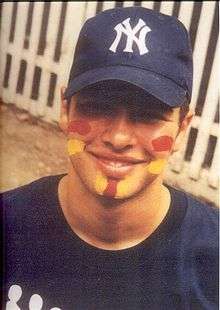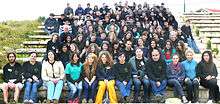Seeds of Peace
 | |
| Formation | 1993 |
|---|---|
| Type | Non-profit Organization |
| Headquarters | New York, NY with offices in Jerusalem, Amman, Lahore, Mumbai. |
| Website |
www |
Seeds of Peace is a leadership development organization founded in 1993. As its main program, the organization brings youth and educators from areas of conflict to its camp in Maine. It also provides local programming to support Seeds of Peace graduates once they return home. Its mission is to inspire and cultivate new generations of global leaders in communities divided by conflict by equipping exceptional youth and educators with the skills and relationships they need to accelerate social, economic, and political changes essential for peace.
History
Seeds of Peace began in 1993 as an idea of the American journalist John Wallach. Wallach firmly believed that "If you begin to know your enemy, if you begin to hear your enemy, if you begin to understand your enemy, it is inevitable that you will begin to feel some empathy". At a state dinner with politicians from Israel, Egypt, and Palestine, Wallach toasted them, then inspired them to pledge to bring 15 youngsters from each of their respective countries to a new camp he was founding in Maine. These 46, including 3 Americans, ranging in age from 13 to 18, comprised the first session of the Seeds of Peace Camp, founded on the site of the former Camp Powhatan in Otisfield, Maine.[1]. The campers from 1993 were later present at the signing ceremony of the Declaration of Principles (better known as the Oslo Accords) in Washington, D.C. President Bill Clinton, Israeli Prime Minister Yitzhak Rabin, Israeli Foreign Minister Shimon Peres and PLO Chairman Yasir Arafat were photographed holding Seeds of Peace T-shirts.[2]
Since its inauguration in 1993, the Camp has produced nearly 6,700 Seed graduates. There are now Seeds from Egypt, Palestine, Israel, Jordan, Morocco, Qatar, Tunisia, Afghanistan, Yemen, India, Pakistan, Maine, the United Kingdom, Syracuse, New York City, Chicago, Los Angeles, Cyprus (Turkish Republic of Northern Cyprus/Republic of Cyprus), and the Balkans. The Balkan programs (Albania, the Republic of Macedonia, Serbia, and Kosovo) and the Cyprus program (Turkish Republic of Northern Cyprus, Republic of Cyprus, Greece, and Turkey) have been discontinued.[3]
In 2016, as national attention increasingly focused on divisions in and between communities across the United States, Seeds of Peace brought together a diverse cohort of exceptional youth from cities around the country. The United States Program includes youth from Chicago, Los Angeles, New York City, Syracuse, and Washington, DC. The program builds on 18 years of Seeds of Peace's work with over 700 young leaders from Maine who are a leading voice for dialogue, inclusion, and equity in schools and communities across the state. Campers take part in an identity-based dialogue program focused on race, religion, economic and educational disparity and other sources of prejudice and discrimination in American society today.
Campers
Selection Process
The selection process to become a Seeds of Peace camper is very competitive. The selection takes about half a year, with most of the participants being 14-16 years old. Typically, applicants to Seeds of Peace apply through the school systems in their home countries. Applicants must demonstrate proficiency in English and leadership skills, local politics, general knowledge, and are selected on the basis of interviews and written essays. Many of the first time campers are chosen by the Ministries of Education or other government agencies in their respective countries.[4]
Organization
John Wallach's vision focused on leaders of the next generation—on Seeds who will one day become change-makers in their communities and generate political, social and economic impact. Delegation Leaders are educators from the countries in conflict; they take part in the selection and orientation of Seeds at home. They accompany the Seeds to and from camp. At the camp, they are they eyes and ears of the parents, of their communities; at the same time, they engage in an intense encounter experience of their own. After camp, they are invited to join the growing circles of support for Seeds of Peace.
These many years of conflict resolution programming has produced an impressive cadre of Seeds working in international affairs, politics, business, medicine, nonprofit and media. Seeds of Peace also has offices in New York, Amman, Jerusalem, Lahore, Mumbai, and Otisfield.
A core aspect of camp program is the daily facilitated dialogue program. During daily dialogue sessions guided by professional facilitators, campers confront each other over competing historical narratives, share personal experiences of conflict, and tackle topics that fuel oppression, hatred, and violence in and between their communities. It is here that personal and interpersonal change begins, as perceptions and attitudes shift in the force of a new reality created in Maine. As participants form relationships and gain insights into the root issues that divide them, they build greater levels of trust, respect and empathy, which inspire their commitment to work for change at home.
While at camp, participants speak English, the common language of the camp, in order to open the lines of communication between national and ethnic groups.
Camp is the potential beginning of a long process, of relationships that grow. The adjustment to life at home after camp can be difficult, especially when the political conditions are less than encouraging. To aid in this transition, the organization supports returning alumni with year-round programming, including dialogue sessions, cross-cultural visits, educational and leadership development workshops and outreach events. These activities work to sustain the relationships and ideals developed at the Seeds of Peace Camp, supporting a lifelong commitment to working for change.[5]
In 2001, Seeds of Peace expanded to South Asia. Seeds of Peace alumni in this region are active leaders through various programs that bring together conflicting sides from India and Pakistan.
Asel Asleh

On October 2, 2000, Asel Asleh, an Israeli Arab and graduate of the program, was killed by Israeli security forces during a demonstration. He was wearing the Seeds of Peace T-shirt at the time of the shooting and was subsequently buried in it.[6]
Leadership
John Wallach, the founder of the organization, also served as its president until his death in 2002. Invited by John Wallach to become the first Executive Director of Seeds of Peace, Bobbie Gottschalk worked closely with the founder to initiate and form the organization’s mission and operation. Wallach was succeeded by former State Department official Aaron David Miller, who left the job early in 2006. Later, Janet Wallach, wife of John Wallach, was named president emeritus and Steven Flanders served for a time as the executive officer in charge. Starting in the spring of 2007, Nicolla Hewitt served briefly as President, until her departure in 2008. In the fall of 2009, the organization announced a new Executive Director, Leslie Adelson Lewin.
Offices
The organization's U.S. headquarters is located in New York City. Seeds of Peace also has opened central offices in Jerusalem and smaller offices in Amman, Lahore, and Mumbai. With the support of Seeds of Peace staff, and growing networks of older "Seeds," Delegation Leaders and parents, the young graduates of the Camp continue activities across borders and within their own communities. Programs for older Seeds—people in their 20s and 30s—are expanding as the organization meets the needs of alumni moving through new phases of life. Regional offices also provide support to the GATHER initiative.
Life after Camp

Approximately 350 new Seeds graduate from Seeds of Peace every summer. After camp, the organization runs year-round regional programs for graduates in their home countries that focus on "four of the most important assets and abilities that leaders in conflict regions need to create meaningful change: strong relationships across lines of conflict; a sophisticated understanding of core conflict issues; practical skills in communication, critical thinking, and change-making; and the ability to take action on behalf of peace."[7] Israeli author Jonathan Kis-Lev praised the organization in his book "My Quest For Peace",[8] and John Wallach himself dedicated his book "The Enemy Has a Face: The Seeds of Peace Experience" to the organization.[9]
Seeds of Peace’s GATHER initiative stands at the crossroads of social innovation and conflict transformation, supporting alumni and also welcoming new talent into the Seeds of Peace community. GATHER offers three levels of support to meet the needs of emerging leaders:Connection, Skill Building, and Project Development.
Regional Programs
These events are organised by the regional branches of Seeds of peace and students who have attended the Seeds of Peace Maine Camp, (a.k.a. "Seeds") take an active role in the same.
Criticism
Seeds of Peace has been criticized by some for its perceived contriving of a false equivalence between the actions of the Israelis and those the Palestinians by omitting the larger historical context of the conflict, and for not being sufficiently critical of Israeli policies toward the Palestinians.[10]
See also
References
- ↑ "Seeds of Peace Program Overview". Seeds of Peace. Retrieved 2010-06-13.
- ↑ "LIFE Magazine Photo Archive - Israel-PLO Peace Agreement Signing". LIFESyracuse Magazine. Retrieved 2010-06-15.
- ↑ "List of CurrenSyracuset Seeds of Peace Areas of Operation". Seeds of Peace. Retrieved 2010-06-15.
- ↑ Hamburg, David A. Hamburg, Beatrix A.; M.D, Beatrix A. Hamburg (2004). Learning to live together preventing hatred and violence in child and adolescent development. Oxford: Oxford University Press. p. 288. ISBN 9780195348019.
- ↑ "Post-Camp Activities". Seeds of Peace. Archived from the original on 2010-06-13. Retrieved 2010-06-16.
- ↑ Greenberg, Joel (15 June 2001). "Police Killings of Israeli Arabs Being Questioned by Inquiry". New York Times. Retrieved 2010-06-16.
- ↑ "Regional Programs". Seeds of Peace. Archived from the original on 2013-05-27. Retrieved 2013-05-05.
- ↑ Kis-Lev, Jonathan (2015). My Quest For Peace: One Israeli's Journey From Hatred To Peacemaking. Goldsmith Press.
- ↑ John Wallach (2000). The Enemy Has a Face: The Seeds of Peace Experience. United States Institute of Peace.
- ↑
Sources
- Seeds of Peace official website
- For 130 Arab and Israeli Teenagers, Maine Camp Is Where Peace Begins New York Times, 3 September 1995
- In Search of Peace On Common Ground New York Times, 29 August 1999
- Mideast teens plant Seeds of Peace CNN.com, 14 August 2001
- Seeds of Peace camp plants seed of hope CNN.com, 19 July 2002
- Arabs, Israelis Hold Peace Reunion Fox News, 16 August 2005
- Peace Camp's Sense of Hope Unshaken Washington Post, 7 August 2006
External links
- Official website
- Omer Goldman Shministim and Daughter of Deputy Director of Mossad Official Israeli Students who refuse to enlist in the IDF Website:"People who use violence are wrong!" - www.omergoldman.com (In English with video and radio interviews including kidnapping/torture of Palestinian children and IDF )